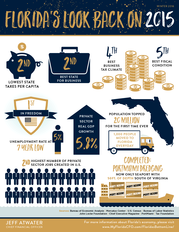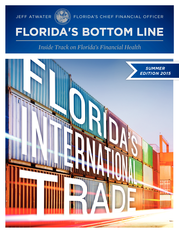Description
FALL 2015
1
st
IN
EDUCATIONAL
FREEDOM
5TH BEST
BUSINESS
TAX CLIMATE
HIGHEST PRIVATE
JOB GROWTH
2ND BEST
AMONG PEER STATES
INFRASTRUCTURE
5TH BEST
FISCAL CONDITIONS
2ND BEST STATE
FOR BUSINESS
Sources: Bureau of Labor Statistics, September 2015 | Mercatus Center
John Locke Foundation | Chief Executive Magazine | U.S. Chamber | PIRG | Tax Foundation
JEFF ATWATER
CHIEF FINANCIAL OFFICER
Jeff Atwater | Chief Financial Officer
For more information about Florida’s economy, please visit
Florida’s Bottom Line 9
www.MyFloridaCFO.com/FloridasBottomLine/
.
Regulations Presentations
+
Regulations Sub Categories














